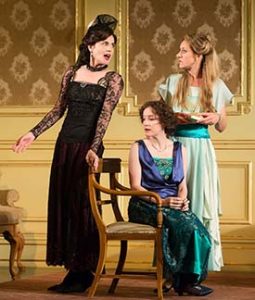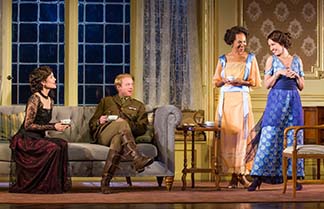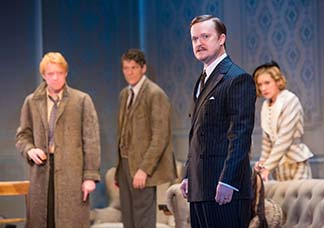By Lucy Komisar

Before the First World War, things in England seemed quite solid, unmoving, as far as classes went. The upper class was frivolous, its members assumed everything about their lives would remain pretty much the same. Nice homes, nice parties. At the opening, a family and friends in Yorkshire are doing charades, underlining lives of fantasy.
But the interwar years seemed to change everything, to auger in a seismic shift in class relations. J.B. Priestley‘s absorbing 1937 play about what happened to one family and the people whose lives they touched explains how by the time the Second World War occurred, to be followed by the victory of the Labor Party, the ascendancy of the upper class was not so assured. At least, money would matter more than class.
The harbinger of that shift is the guy at the party who nobody likes, the slightly creepy Ernest Beevers (the very good Steven Boyer) who knows he wants to marry well, into the upper class, and bides his time. Priestley also remarks on the role of women – and how the ones who do best are smart women who don‘t marry. The Conways are headed by a matriarch (the fine, biting Elizabeth McGovern); the father has drowned. But the children are charmers.

By 1937, nothing good has happened to most of the family. Daughter Hazel (played as a silly thing by Anna Camp) has made a disastrous marriage with Beevers, by then a rich businessman. Joan Helford (Cara Rickets) has made a bad match with the charming Robin (Matthew James Thomas), the Conway son who came back from the Air Force with little plan of what he would do with his life. So, he used up the family money and drank.
Of course, the ones who interested me were the smart women, Kay (the terrific Charlotte Parry), the would-be novelist, and Madge (Brooke Bloom), the socialist. “You don‘t realize how poor most people are,” she told the others. The stolid, uninteresting Alan (Gabriel Ebert) has a clerk‘s job. That realism is the only choice that keeps him afloat.
Nearly two decades after the fantasy party, Kay, a bit cynical, in an unhappy affair with a married guy, does unexceptional journalism; she is writing a piece about South Hampton, not a novel.

Joan hasn‘t seen Robin in months. Madge is to be a senior mistress at a large public girls‘ school, though she says, “The life you don‘t see is my real life.”
Hazel arrives with a fur collar, befitting her wealth, but when the bully Ernest appears, square faced in a pin-striped suit, you don‘t envy her.
Then you see what they did in the intervening years, how they all got there. It‘s the kind of plot that could be a soap opera or high-concept TV serial, if the writing wasn‘t so subtle, the characters so good and director Rebecca Taichman so focused and sharp.
“Time and the Conways.” Written by J.B. Priestley, directed by Rebecca Taichman. American Airlines Theatre, 227 West 42nd Street, New York City. 212-719-1300. Opened Oct 10, 2017, closes Nov 26, 2017. 11/8/17.

